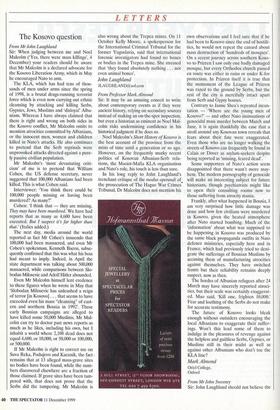From Professor Mark Almond Sir: It may be an amusing
conceit to write about contemporary events as if they were ancient history, relying on secondary sources instead of making an on-the-spot inspection, but even a historian as eminent as Noel Mal- colm risks undermining confidence in his historical judgment if he does so.
Noel Malcolm's Short History of Kosovo is the best account of the province from the mists of time until a generation or so ago. However, on the frequently murky recent politics of Kosovan Albanian-Serb rela- tions, the Maoist-Mafia KLA organisation and Nato's role, his touch is less than sure.
In his long reply to John Laughland's trenchant critique of the modus operandi of, the prosecution of The Hague War Crimes Tribunal, Dr Malcolm does not mention his
own observations and I feel sure that if he had been to Kosovo since the end of hostili- ties, he would not repeat the canard about mass destruction of 'hundreds of mosques'. On a recent journey across southern Koso- vo to Prizren I saw only one badly damaged mosque, but every Orthodox church passed en route was either in ruins or under K-for protection. In Prizren itself it is true that the monument of the League of Prizren was razed to the ground by Serbs, but the rest of the city is mercifully intact apart from Serb and Gypsy houses.
Contrary to Jamie Shea's repeated incan- tation — 'Where are the young men of Kosovo?' — and other Nato insinuations of genocidal mass murder between March and June, it is again thankfully the case that a stroll around any Kosovan town reveals that fears about their fate were exaggerated. Even those who are no longer walking the streets of Kosovo can frequently be found in Calais or Dover as asylum-seekers despite being reported as 'missing, feared dead'.
Some supporters of Nato's action seem disappointed that there wasn't more may- hem. The modern pornography of genocide will make an interesting subject for future historians, though psychiatrists might like to open their consulting rooms now to those suffering from atrocity mania.
Frankly, after what happened in Bosnia, 1 am very surprised how little damage was done and how few civilians were murdered in Kosovo, given the heated atmosphere after Nato started bombing. Much of the `information' about what was supposed to be happening in Kosovo was produced by the same black propaganda outfits in Nato defence ministries, especially here and in France, which had previously tried to deni- grate the sufferings of Bosnian Muslims by accusing them of manufacturing atrocities against themselves. They have switched fronts but their reliability remains deeply suspect, now as then.
The hordes of Albanian refugees after 24 March may have sincerely reported atroci- ties, but their scale was certainly exaggerat- ed. Mao said, 'Kill one, frighten 10,000.' Fear and loathing of the Serbs do not make for accurate testimony.
The future of Kosovo looks bleak enough without outsiders encouraging the local Albanians to exaggerate their suffer- ings. Won't this lead some of them to indulge in the pleasures of revenge against the helpless and guiltless Serbs, Gypsies, or Muslims still in their midst as well as against other Albanians who don't toe the KLA line?
Mark Almond
Oriel College, Oxford


























































































 Previous page
Previous page